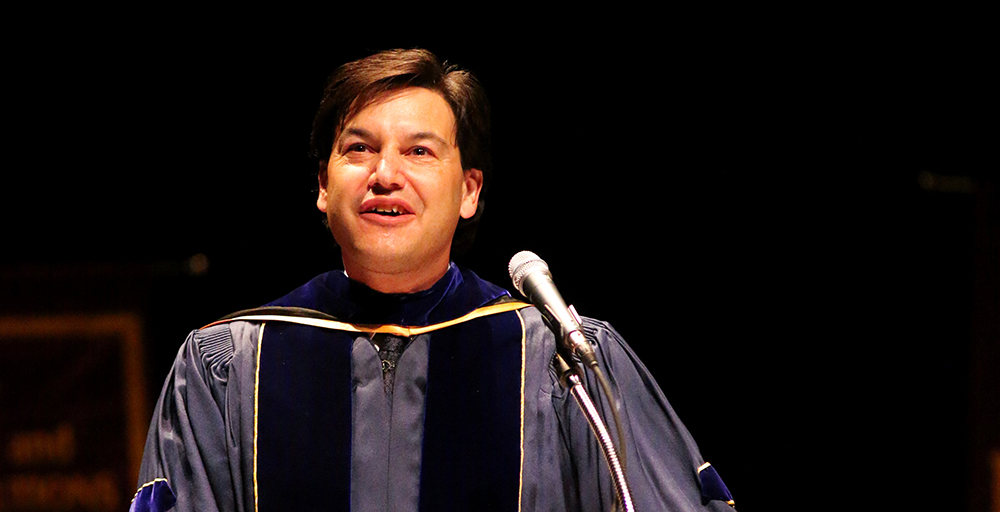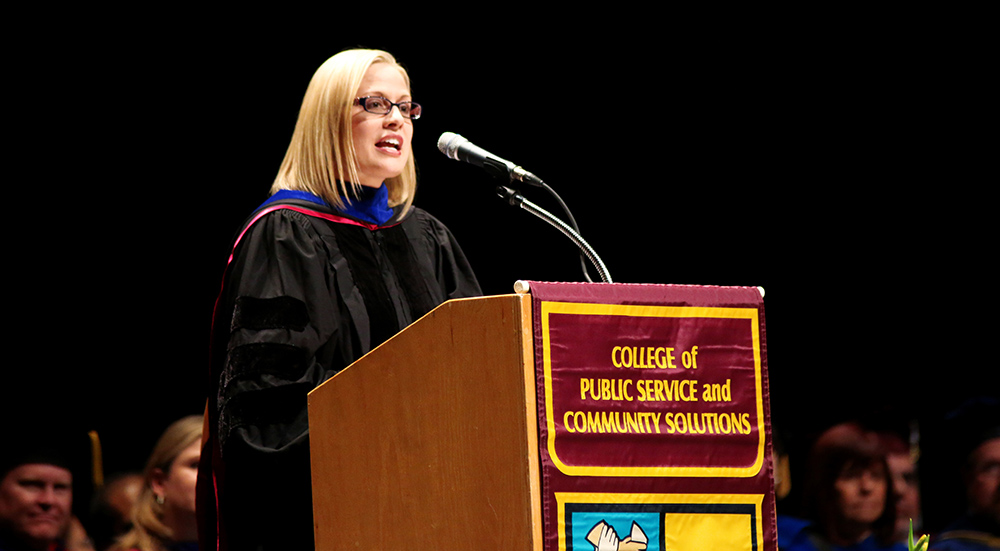Public Service grads told to resist fear and anger: 'Be the difference'

About 330 people graduated from ASU's College of Public Service and Community Solutions in December. The college includes schools of criminology and criminal justice, social work, public affairs and community resources and development (parks, recreation, tourism and nonprofits).
Dean Jonathan Koppell told some 330 graduates at Arizona State University's College of Public Service and Community Solutions convocation on Dec. 13 that he hoped the current political climate would not diminish their sense of optimism for work in the public interest.
“So we live in a time of extraordinary fear, all kinds of fear,” Koppell told the crowd at Comerica Theatre in downtown Phoenix. “I’m not saying that fears can be unfounded. But the fear can’t be paralyzing, and it can't be the only basis upon which people are mobilized.”
A political scientist by training, Koppell reminded the 5,000 people in attendance that there are legitimate kinds of fears. Fear of terrorists. Fear of cutting off Social Security. Fear of losing rights. And fear of an intrusive state.
“All these things are powerful and real and they can be enormously powerful as tools,” Koppell said. “But it’s very hard to use them to create constructive change.”
The dean reminded the audience of the famous words spoken by President Franklin D. Roosevelt at his first inaugural address: “... that the only thing we have to fear is fear itself — nameless, unreasoning, unjustified terror which paralyzes needed efforts to convert retreat into advance.”
Koppell said he has a better appreciation for what Roosevelt was responding to as he took office during a time of crippling unemployment and poverty.
“Now I understand his warning,” he said. “You’ve reached this day having overcome great challenges.
“You did not accept that what you accomplished today was not possible because it was scary.”
“Fear didn’t own you,” Koppell reminded graduates. “You got here because you believed and you were optimistic about what could be done.”

Jonathan Koppell, dean of the College of Public Service and Community Solutions, addresses students at the Fall 2016 Convocation held at Comerica Theatre in downtown Phoenix on Dec.13.
Jonathan Koppell, dean of the College of Public Service and Community Solutions, addresses students at the Fall 2016 Convocation held at Comerica Theatre in downtown Phoenix on Dec. 13.
He suggested there was one other emotion that poses a significant danger.
“Anger seems to be in the air everywhere,” Koppell cautioned. “It is, along with fear, the other powerful emotion that seems to govern most discourse in the public and the private realm.”
As proof, he pointed to the comment section of news articles on the internet.
“If you look down at the comment sections, it will only take a couple lines before people are spewing the most vile, vitriolic, hateful things that you've ever seen,” said Koppell.
He reminded students that anger would make it impossible to do any of the things U.S. Rep. Kyrsten Sinema — the ceremony's keynote speaker — suggested they pursue.
“If we only feel rage and anger, then how do you listen?” asked Koppell. “If you only feel anger, then how do you empathize?
“How do you learn? How do you craft solutions that don’t come from anger?”
Koppell pointed out that anger would not have helped them pass their tests.
“You didn’t succeed when all the obstacles in your way said you couldn't — out of anger,” Koppell said. “So I suggest to you that in order to be successful in public service you have to hold back on the very things that are so powerful — fear and anger.”
Hard work and a helping hand
Sinema delivered the keynote address, discussing the polarization in the U.S.
“We face a significant challenge today. The fight between the two edges has gotten severe,” Sinema said in a soft and somber tone. “I’ve recently said that these folks on the edges — they’re pulling at the fabric of their country and they are ripping the seams.
“But we can’t let that happen. We, those of us here today, all of us committed to public service — we must be the difference. We must be different.”
Sinema is a 1999 graduate of the college and a lecturer in the School of Social Work. She told students that those committed to public service can make a difference by trying to better understand another person’s life experiences and perspectives.
“We can be good people who care deeply about each other even when we disagree,” said Sinema. “We can all start by listening to someone with a different opinion, listening not to rebut or debate, but listening to understand.”

Representative Kyrsten Sinema delivers the keynote address to graduates at the Fall 2016 College of Public Service and Community Solutions Convocation.
A Tucson native, Sinema told her family’s story of going from middle class to a life of poverty living in an abandoned gas station. She said her family utilized government food stamps, and she relied on free school lunches and used federal grants to help pay for college.
Sinema saw education as essential to leaving poverty. She was valedictorian of her high school class at age 16 and graduated from Brigham Young University with a bachelor’s degree in social work at age 18. She was employed as a social worker at a Phoenix school district before earning a graduate degree in social work from ASU in 1999. She went on to receive a law degree and a PhD from ASU.
In fact, Sinema was in law school in 2004 when she ran and won a seat in the Arizona Legislature, where she served four terms. She was elected to Congress in 2012 and will soon begin her third term representing Arizona’s Ninth Congressional District. A progressive Democrat, Sinema has earned a reputation for working with members of both major political parties on a variety of issues.
“There’s a conservative and a liberal narrative in our country, and often those two narratives are pushed against each other,” she told students.
“A conservative narrative says: ‘Hey kid, pull yourself up from your bootstraps! Do it yourself. Work hard,’” Sinema said. “And a liberal narrative might say: ‘You need to help those who are vulnerable. We need a safety net. Leave no one behind.’”
“The truth is that both of these narratives are true and they need each other,” said Sinema. “My whole life, my journey from homelessness to serving in the halls of the United States Congress is the combination of these two narratives.
“I worked so hard to make it, and thank goodness that there were people there to give me the helping hand I needed growing up.”
Embrace differences
With convocation taking place a month after a polarizing presidential election, College of Public Service and Community Solutions Deann Koppell told graduates not to be distracted by the adversarial tone of current discourse. Instead, he insisted it’s an opportunity for “rededication to the ideals that animate us today.”
“We are strong precisely because of our differences, including differences in beliefs,” said Koppell. “Our willingness and ability to engage constructively with people whose views are dramatically different than our own is our greatest asset.”
Koppell suggested that the current divisions should be cause for introspection with the goal to improve the ability to build bridges and to “stand up to injustice when we see it.”
“Let it be cause for vigilance to ensure that the rights and protections — which every member of our community is entitled to — are defended and preserved,” emphasized Koppell.
The dean called on graduates not to give up.
“Let it not be a cause to abandon the ideals of service or the search for solutions to our shared challenges,” Koppell said. “And let it not be a cause to fear free expression and dialogue.”
Koppell reminded graduates that the nation had faced deep divisions and uncertainty in the past only to emerge stronger. He acknowledged that this kind of optimism does not diminish the real struggles ahead, only that it illuminates the hard work that remains.
“Your optimism in getting here today, your optimism regarding our future is an inspiration to me,” Koppell confessed. “It's what gives me hope, and I urge you to retain it.
“Use it as a source of strength. It is what we need today, more than anything else.”
More Law, journalism and politics

Native Vote works to ensure the right to vote for Arizona's Native Americans
The Navajo Nation is in a remote area of northeastern Arizona, far away from the hustle of urban life. The 27,400-acre…

New report documents Latinos’ critical roles in AI
According to a new report that traces the important role Latinos are playing in the growth of artificial intelligence technology…

ASU's Carnegie-Knight News21 project examines the state of American democracy
In the latest project of Carnegie-Knight News21, a national reporting initiative and fellowship headquartered at Arizona State…